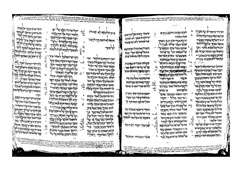Jeremiah 21
| Jeremiah 21 | |
|---|---|
|
Book of Jeremiah in Hebrew Bible, MS Sassoon 1053, images 283-315. | |
| Book | Book of Jeremiah |
| Bible part | Old Testament |
| Order in the Bible part | 24 |
| Category | Nevi'im |
Jeremiah 21 is the twenty-first chapter of the Book of Jeremiah in the Hebrew Bible or the Old Testament of the Christian Bible. This book contains the prophecies spoken by the prophet Jeremiah, and is a part of the Books of the Prophets.[1][2] This chapter contains a record of Jeremiah's message to king Zedekiah, Jeremiah 21:1-10; including warnings to the House of David and Jerusalem, Jeremiah 21:11-14.[3]
Text
- The original text is written in Hebrew language.
- This chapter is divided into 14 verses.
Textual versions
Some most ancient manuscripts containing this chapter in Hebrew language:
- Masoretic Text (10th century)
- Dead Sea Scrolls: (2nd century BC)[4][5]
- 4QJera (4Q70): extant: verse 1
- 4QJerc (4Q72): extant: verses 7‑10
Ancient translations in Koine Greek:
- Septuagint (3rd century BC)
- Theodotion version (~AD 180)
Structure
NKJV groups this chapter into:
- Jeremiah 21:1-10 = Jerusalem’s Doom Is Sealed
- Jeremiah 21:11-14 = Message to the House of David
Verse 1
- The word which came to Jeremiah from the Lord when King Zedekiah sent to him Pashhur the son of Melchiah, and Zephaniah the son of Maaseiah, the priest, saying (NKJV)[6]
- Huey noted that some scholars regard Jeremiah 37:3-10 as a "background for Jeremiah 21:1-7".[7]
- "Pashhur the son of Melchiah": Also named in Jeremiah 38:1.[8]
- "Zephaniah the son of Maaseiah": the “second priest,” or deputy in Jeremiah 52:24; later with others, he came again to Jeremiah for advice (Jeremiah 37:3-4)[9] and was executed by Nebuchadnezzar at Riblah (Jeremiah 52:24-27).[10] According to Huey, he "was not hostile to Jeremiah" (Jeremiah 29:25,29; Jeremiah 37:3).[11]
Verse 9
- He who remains in this city shall die by the sword, by famine, and by pestilence; but he who goes out and defects to the Chaldeans who besiege you, he shall live, and his life shall be as a prize to him. (NKJV)[12]
- Huey, and others as well, noted that the wording of this verse is similar to Jeremiah 38:2,[13] but concluded that the prophecy could have been announced repeatedly.[14]
See also
- Related Bible parts: 1 Chronicles 24, Jeremiah 38, Jeremiah 39, Jeremiah 52
Notes and references
- ↑ J. D. Davis. 1960. A Dictionary of The Bible. Grand Rapids, Michigan: Baker Book House.
- ↑ Therodore Hiebert, et.al. 1996. The New Interpreter's Bible: Volume: VI. Nashville: Abingdon.
- ↑ Huey 1993, p. 198-202.
- ↑ Jull, Timothy A. J.; Donahue, Douglas J.; Broshi, Magen; Tov, Emanuel (1995). "Radiocarbon Dating of Scrolls and Linen Fragments from the Judean Desert". Radiocarbon. 37 (1): 14. Retrieved 11 July 2017.
- ↑ Ulrich 2010, p. 570.
- ↑ Jeremiah 21:1
- ↑ Huey 1993, p. 198.
- ↑ Ryle 2009.
- ↑ The Nelson Study Bible 1997, p. 1262-1263.
- ↑ The New Oxford Annotated Bible with the Apocrypha, Augmented Third Edition, New Revised Standard Version, Indexed. Michael D. Coogan, Marc Brettler, Carol A. Newsom, Editors. Publisher: Oxford University Press, USA; 2007. p. 1111-1112 Hebrew Bible. ISBN 978-0195288810
- ↑ Huey 1993, p. 199.
- ↑ Jeremiah 21:9
- ↑ Notes [b] in New King James Version on Jeremiah 38:2.
- ↑ Huey 1993, p. 333.
Bibliography
- Ryle, Herbert Edward (2009). The Cambridge Bible for Schools and Colleges Paperback. BiblioBazaar. ISBN 9781117708690.
- Huey, F. B. (1993). The New American Commentary - Jeremiah, Lamentations: An Exegetical and Theological Exposition of Holy Scripture, NIV Text. B&H Publishing Group. ISBN 9780805401165.
- The Nelson Study Bible. Thomas Nelson, Inc. 1997. ISBN 9780840715999.
- Ulrich, Eugene, ed. (2010). The Biblical Qumran Scrolls: Transcriptions and Textual Variants. Brill.
External links
Jewish
Christian
This article is issued from
Wikipedia.
The text is licensed under Creative Commons - Attribution - Sharealike.
Additional terms may apply for the media files.
